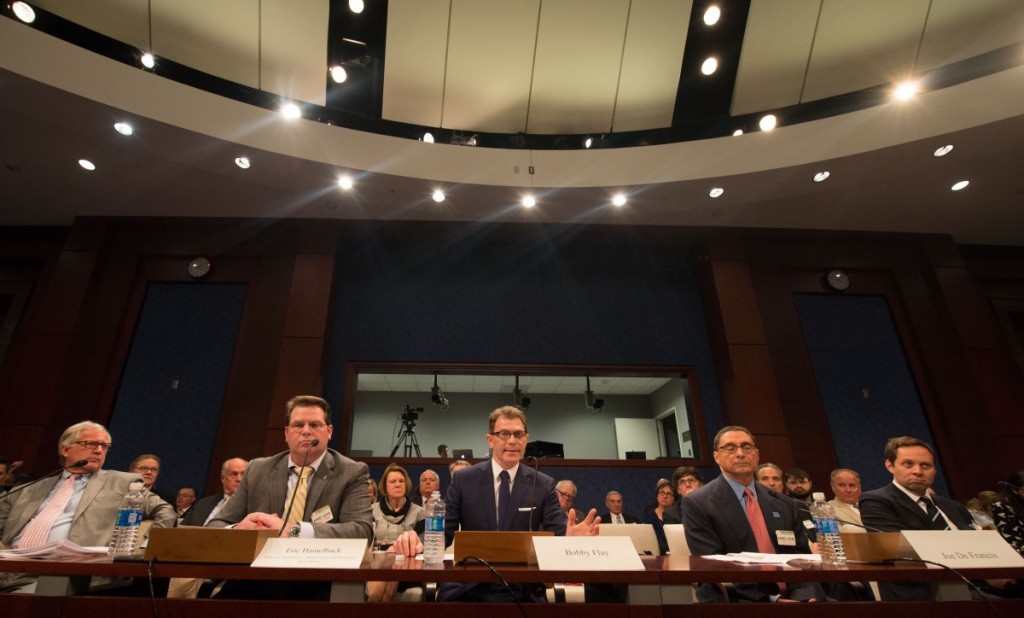
Kara Hahn, majority leader of the Suffolk County Legislature, speaks at a news conference in Hauppauge on Feb. 25, 2016. Photo Credit: Newsday / John Paraskevas
Democratic and Republican county legislators in Suffolk are preparing a bill to create a new office to probe corruption, fraud and waste in county government, but County Executive Steve Bellone says the bill is premature, and the county’s largest police union is opposed.
The bill sponsored by Legis. Kara Hahn (D-Setauket) in consultation with Republicans and other Democrats is a response to recent federal investigations into Suffolk County law enforcement officials, according to the draft of the bill obtained by Newsday.
The new “Office of Public Accountability and Whistleblower Protection” would have subpoena power to investigate complaints against elected officials and county employees, as well as allegations of fraud, waste, abuse and mismanagement.
The office would refer matters to local, state or federal authorities, but wouldn’t have the authority to prosecute. It would be headed by a director confirmed by two-thirds of the county legislature. No former or current employee of the county could be appointed director, and the director could not have any relative on the county payroll, according to the draft bill.
“We’re clearly working on serious reforms; we’re clearly working on something with real oversight,” said Hahn, who said she intends to introduce a version of the bill before the end of the year.
This year, former Suffolk Police Chief of Department James Burke pleaded guilty to federal charges of beating a suspect and orchestrating a cover-up, and a federal jury convicted former sheriff’s lieutenant and Conservative Party chairman Edward Walsh of falsely billing the county for more than $200,000 worth of time he didn’t work.
ADVERTISEMENT | ADVERTISE ON NEWSDAY
Newsday has reported that federal authorities are investigating Christopher McPartland, the Suffolk district attorney’s top corruption prosecutor, for possible obstruction of justice related to the Burke case.
In an interview, Bellone said the county should wait until the federal probe has finished before proposing anti-corruption measures.
“We should not do the typical government thing, adopting new regulatory agencies that add more costs onto taxpayers ... N> when we don’t even fully understand how our current agencies failed,” Bellone said. He noted that the police department has increased the number of internal affairs investigators and appointed new top officials with federal law enforcement experience.
Noel DiGerolamo, president of the Suffolk Police Benevolent Association, said he is confident of existing authorities’ ability to investigate corruption.
“We have District Attorney investigations, federal government investigations — adding another level of bureaucracy to do what?” he said.
DiGerolamo said police officers might not have to comply with subpoenas from the new office because of provisions in their union contract that he did not specify. DiGerolamo, however, said he would support a bill to offer protection to whistleblowers.
Presiding Officer DuWayne Gregory (D-Amityville) said Democratic and Republican legislative leaders have been working on the legislation “to restore the public’s confidence” in county government.
Minority Leader Kevin McCaffrey (R-Lindenhurst), who belongs to a bipartisan working group that is crafting the anti-corruption legislation, said the county can’t wait for federal prosecutors to act.
“We need to be policing ourselves,” McCaffrey said.
Asked why District Attorney Thomas Spota’s office couldn’t investigate allegations of corruption, Newsday style-nmworking group member Rob Calarco (D-Patchogue), the deputy presiding officer, said: “It’s clear at this point we need to have an entity that is unbiased and nonpolitical, nonpartisan, for different people to make complaints.”
ADVERTISEMENT | ADVERTISE ON NEWSDAY
Robert Clifford, a spokesman for the district attorney’s office, did not respond to a request for comment.
The draft bill does not address how to pay for the new department.
Savings produced by a reduction in the number of district attorney investigators could help fund the new office, legislative sources said.





